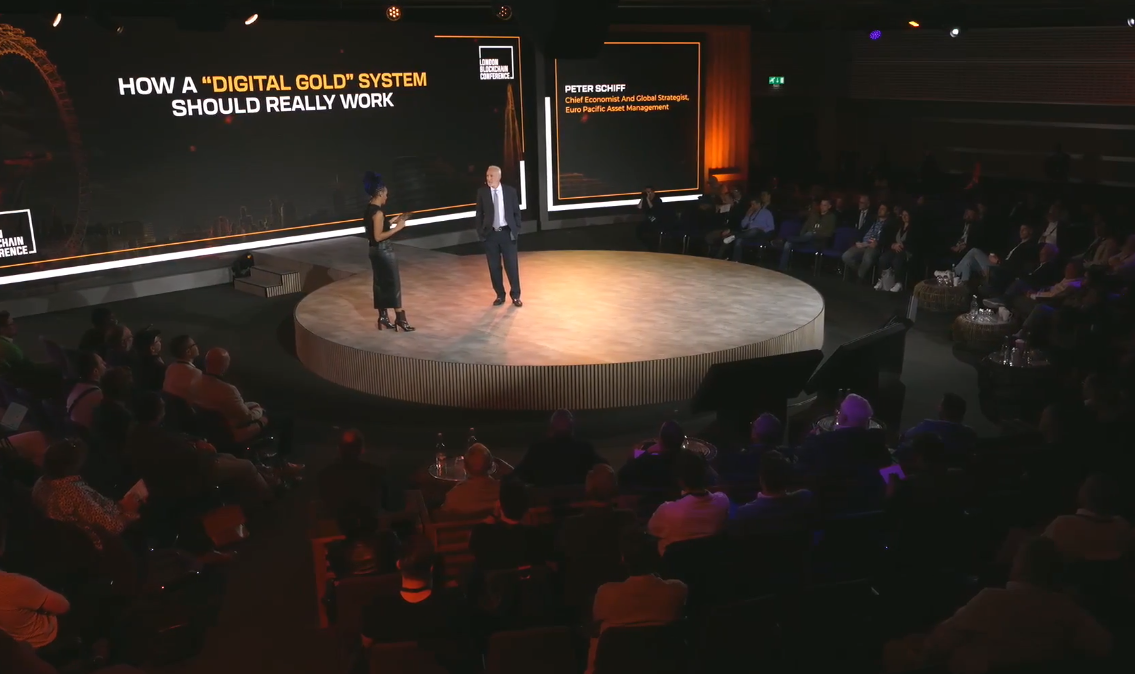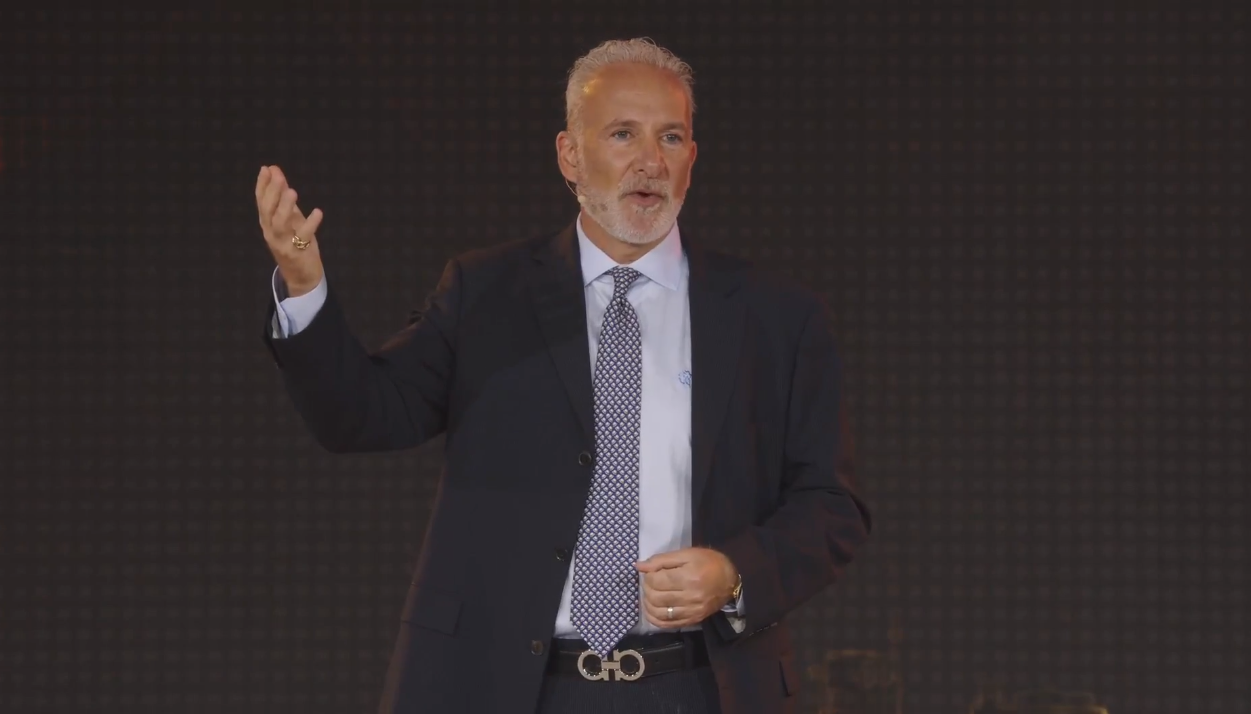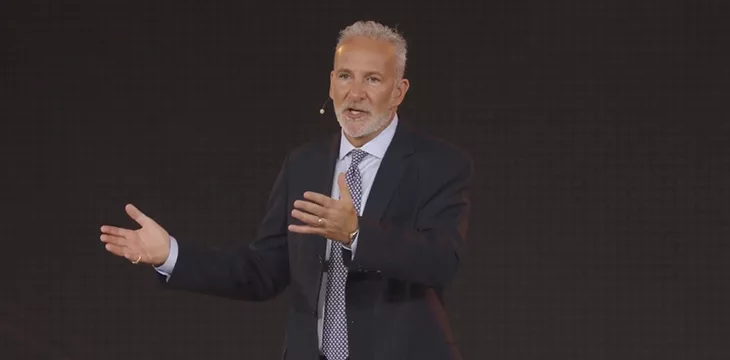|
Getting your Trinity Audio player ready...
|
A conference about blockchain technology focusing not on hype or speculation but on utility will naturally bring out a more dynamic crowd than you’re used to seeing at other industry events.
Nowhere was this more evident than in the keynote speaker for the final day of the London Blockchain Conference — Peter Schiff.
Schiff is a notorious advocate for gold in the financial system and a prominent critic of the speculative digital asset hype, which has made him a natural enemy of BTCers and, in particular, on social media. In fact, if you’ve heard of Schiff, there’s a non-zero chance you first came across him in exactly that context.
But one thing that Peter Schiff isn’t is—a critic of blockchain or even digital currencies in general. On the contrary, Schiff has clear ideas about the role blockchain—and gold—can play in the global monetary system and the inevitable financial turmoil he says is right around the corner.

“I think the world is on the verge of a monetary upheaval,” he told a room packed out by people eager to hear from the reputed crypto critic.
“The current monetary system is based largely on the U.S. dollar. The problem is that since 1971 the U.S. dollar has been based on nothing.”
He explained that before 1971, the U.S. dollar was legally defined as a measure of gold, gold being the backing behind each dollar. On that basis, he said, the U.S. was able to convince the rest of the world to back their own currencies by the dollar. But the U.S. abandoned the gold standard in 1971 and stopped guaranteeing the exchange of dollars for gold. Since then, according to Schiff, the world has been operating on a fiat system where another currency backs up one currency, but there’s ultimately nothing of concrete value backing up the system.
“Right now, the United States is running a budget deficit in excess of $2 trillion a year,” he said.
“At the same time, our trade deficits exceed $1 trillion a year. That’s how dysfunctional the U.S. economy has become under this system: the ability to create the reserve currency out of thin air means Americans don’t have to produce in order to consume. All they need to do is print paper and exchange that for goods that the rest of the world produces.”
“The only reason that can happen is because the rest of the world collectively lives beneath its means in order to subsidize the extravagant standard of living of Americans.”
Enter the global upheaval Schiff warned about at the top of his talk: inflation. Record rates of inflation around the world since 2022, and the monetary policy enacted by central banks to counter it, have exposed fiat’s susceptibility to volatility and called its reliability into question. When inflation reaches a point where fiat is devalued too fast to be relied upon as a means of exchange, the U.S. dollar begins to lose its role as a reserve currency.
“What will drive an alternative is the sellers of goods and services who want to be paid in real money. They won’t sell something and accept fiat in exchange if the value is eroding way too rapidly.”
“There’s this idea that the dollar won’t be replaced because there’s nothing to replace it with because every other fiat currency is in a similar position,” he added. “But the dollar didn’t really replace another currency; it replaced money. It replaced gold. So, I think the future isn’t another fiat currency to replace the dollar—it is gold replacing the dollar as the primary monetary reserve.”
“One way that could be introduced is through the private sector, probably even before the government, through blockchain.”
If your entire experience with blockchain has been in the BTC bubble, you might be surprised to hear Schiff say this. In that bubble, BTC and blockchain are interchangeable—so how could such a prominent critic of BTC say blockchain is the answer to the world’s problems?
It’s because Schiff recognizes that BTC is not blockchain—and BTC, he says, isn’t an answer at all. Blockchain is—backed by gold.
“With the internet, with blockchain, there is a major improvement in the functionality of gold to act as a medium of exchange and as a unit of account,” he explained. “The role of gold as a store of value, that doesn’t change.”

But to serve as a currency, it’s not enough for gold to be a store of value: it needs to be transactable.
“With the internet, with blockchain, it’s never been easier. I don’t have to physically be in the same room or even the same country in order to transact.”
Note he says blockchain—not BTC (which Schiff uses interchangeably with ‘Bitcoin’).
“They say ‘you can’t buy a cup of coffee with gold, but you can with bitcoin’—but you really can’t buy a cup of coffee with bitcoin because that’s going to be very expensive. It’s too volatile, too expensive to be a medium of exchange. And it can never be a store of value because it doesn’t have any value—it’s just worth what someone is willing to pay for it.”
What’s needed is for a blockchain to be used to tokenize real gold, providing all the benefits promised by the blockchain (namely, the ease, speed, and cost-effectiveness of transacting) without abandoning the real-world value offered by gold. A system that can achieve that will have the perfect blueprint for a new reserve currency, says Schiff.
And just like the choice of gold as currency was originally driven by the public (thanks to its inherent value as a metal), so too will this new blockchain-powered replacement be driven.
“The reason governments started using gold as money was that it was the money chosen by the public,” he said. “If the government wanted goods or services, it had to pay with gold; if it wanted soldiers, it needed to pay them in gold. So, it was the private sector which invented gold as money. Other governments ultimately just got involved.”
So to Schiff, it’s gold that was always underpinning the fiat currency that served as the default means of transacting—at least until 1971. What blockchain can do is replace fiat as a superior method to exchange increments of real money—gold. It can do it better than fiat and better than any of the legacy payment providers, which take fees at multiple points throughout the process.
“That’s the beauty of a monetary system on a blockchain—I can take a tiny piece of gold and use it to buy a cup of coffee, and that transaction could be effected at a fraction of the cost of transferring bitcoin and in a reliable manner.”
So in that way, though Schiff wouldn’t be drawn to comment on any specific blockchain in his post-speech Q&A, all we’re waiting on is a blockchain that can transact at scale with minimal fees, high speeds, and perfect verifiability—which is what everyone listening to Schiff’s talk just spent two days learning about in BSV.
Watch: Gold as a commodity

 02-25-2026
02-25-2026 




